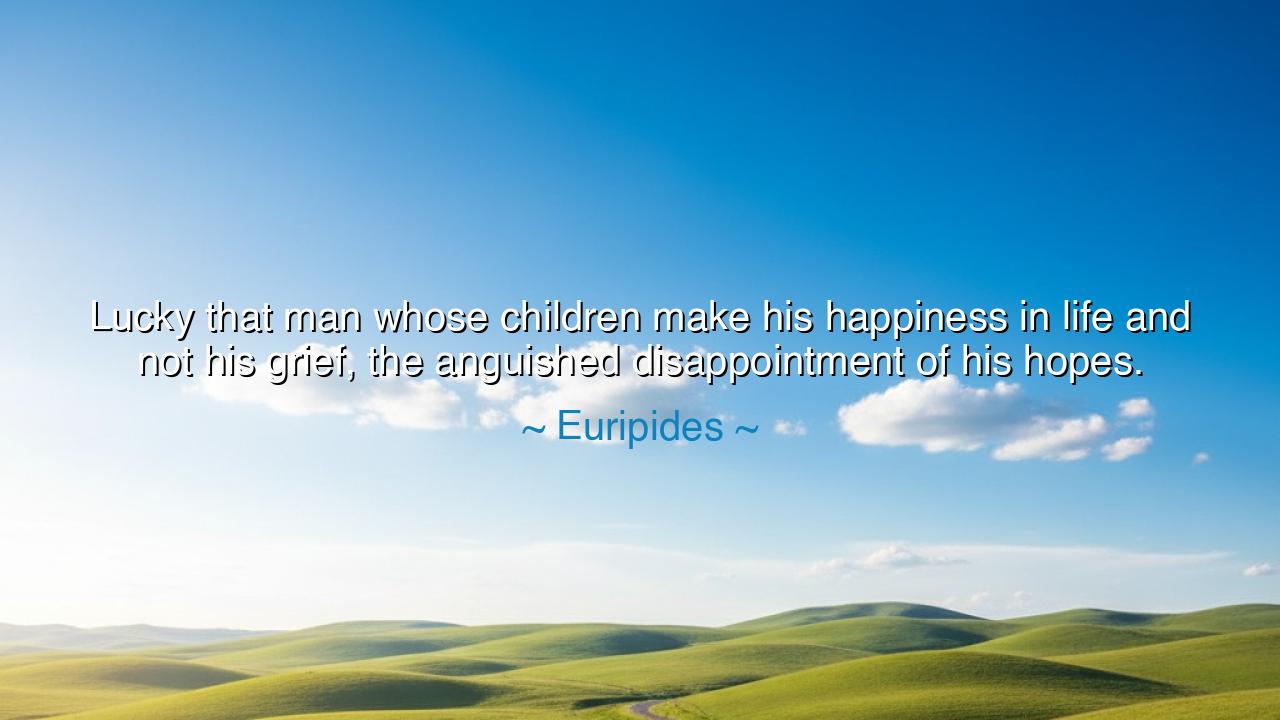
Lucky that man whose children make his happiness in life and not
Lucky that man whose children make his happiness in life and not his grief, the anguished disappointment of his hopes.






“Lucky that man whose children make his happiness in life and not his grief, the anguished disappointment of his hopes.” So spoke Euripides, the tragic poet of Greece, whose words still echo through the centuries like a lament sung beneath the marble columns of forgotten temples. In these lines, he gives voice to one of life’s deepest truths — that the bond between parent and child is both a source of profound joy and a wellspring of unbearable sorrow. For from the same heart that gives life, love, and teaching, can also arise pain, if those nurtured by devotion turn against the virtues that raised them.
In the ancient world, family was not merely a private matter; it was the foundation of civilization. The Greeks saw in the home a reflection of the state, and in the child, the promise of the future. To have children who bring happiness, who carry forth the spirit, the wisdom, and the honor of their parents — this was the truest blessing the gods could bestow. But when the child grows astray, when pride, folly, or rebellion drive them to reject what is noble, the father’s heart breaks like a ship upon unseen rocks. Euripides knew this too well, for he lived in an age where sons betrayed fathers, and kingdoms fell by the arrogance of heirs.
Consider the story of King Priam of Troy, who reigned with wisdom and gentleness over a mighty city. He had fifty sons, yet one among them — Paris — through vanity and selfish desire, became the instrument of Troy’s ruin. Priam’s love was deep, his forgiveness boundless, yet he watched as his kingdom burned, his sons slain, his people enslaved — all born from the folly of a single child who brought grief and the anguished disappointment of his hopes. Even as he begged Achilles for the body of his slain son Hector, Priam’s tears spoke for every parent whose love has turned to suffering. Such is the terrible power of the child over the heart of the parent: they are the mirror of one’s soul, and that reflection can either illuminate or darken a lifetime.
Yet, not all stories end in sorrow. Think of Marcus Aurelius, the philosopher-emperor, who in his meditations wrote tenderly of his duty toward his children and his hope that they would embody reason and virtue. Though his reign was burdened by war and plague, his writings reveal that his greatest concern was the moral strength of the next generation. He sought not comfort or luxury for them, but wisdom and integrity, that they might live rightly. He knew, as Euripides did, that the true measure of a parent’s success lies not in wealth or power, but in the goodness of their children’s hearts. And though his own son, Commodus, would later betray the ideals of his father, the lesson remains: the soul of a child must be guided, not indulged; nurtured, not merely protected.
The happiness of a parent is thus not found in the fleeting pleasures their children achieve, but in the virtue they embody. For what is joy without goodness? What is pride without character? The wise man rejoices not when his child is admired by the world, but when his child acts rightly in solitude; not when they gain riches, but when they show compassion; not when they conquer others, but when they conquer themselves. The man whose children walk in virtue drinks from the sweetest fountain of life — one that refreshes him even in age and sorrow.
But woe to the one whose offspring bring him shame — for such pain pierces deeper than any spear. It is a wound that time cannot easily close. The anguished disappointment of his hopes is the most human of tragedies, for it springs not from hatred but from love betrayed. It reminds us that the future is never guaranteed, that every heart, even that of a child, must choose its own path toward light or darkness.
Let us then take Euripides’ wisdom as a sacred charge: to raise our children not as extensions of our pride, but as stewards of virtue. Teach them to love truth more than victory, kindness more than comfort, and honor more than gain. Let them see in our actions the strength of what we preach. Speak gently, but guide firmly; love deeply, but hold to principle. For only when we shape character with patience and example can we hope to find, in our children, the happiness of life and not its grief.
And if you would live wisely, remember this final counsel: invest your heart not merely in your child’s success, but in their goodness. Be the gardener who tends not the flowers for beauty, but the roots for endurance. Then, even as years pass and fate shifts like the sea, you shall stand among the truly lucky — those whose children are their joy, whose legacy is love, and whose hopes, far from anguished, become immortal.






AAdministratorAdministrator
Welcome, honored guests. Please leave a comment, we will respond soon